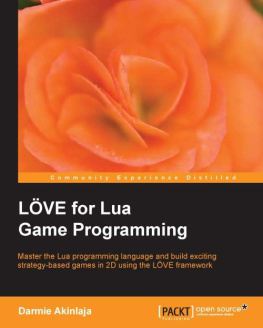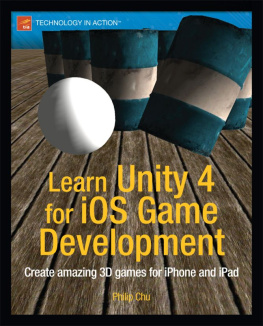Jebediah Pavleas - Learn 2D Game Development with C#
Here you can read online Jebediah Pavleas - Learn 2D Game Development with C# full text of the book (entire story) in english for free. Download pdf and epub, get meaning, cover and reviews about this ebook. year: 2013, publisher: Apress, genre: Computer. Description of the work, (preface) as well as reviews are available. Best literature library LitArk.com created for fans of good reading and offers a wide selection of genres:
Romance novel
Science fiction
Adventure
Detective
Science
History
Home and family
Prose
Art
Politics
Computer
Non-fiction
Religion
Business
Children
Humor
Choose a favorite category and find really read worthwhile books. Enjoy immersion in the world of imagination, feel the emotions of the characters or learn something new for yourself, make an fascinating discovery.
- Book:Learn 2D Game Development with C#
- Author:
- Publisher:Apress
- Genre:
- Year:2013
- Rating:5 / 5
- Favourites:Add to favourites
- Your mark:
Learn 2D Game Development with C#: summary, description and annotation
We offer to read an annotation, description, summary or preface (depends on what the author of the book "Learn 2D Game Development with C#" wrote himself). If you haven't found the necessary information about the book — write in the comments, we will try to find it.
2D games are hugely popular across a wide range of platforms and the ideal place to start if youre new to game development. With Learn 2D Game Development with C#, youll learn your way around the universal building blocks of game development, and how to put them together to create a real working game.
C# is increasingly becoming the language of choice for new game developers. Productive and easier to learn than C++, C# lets you get your games working quickly and safely without worrying about tricky low-level details like memory management. This book uses MonoGame, an open source framework thats powerful, free to use and easy to handle, to further reduce low-level details, meaning you can concentrate on the most interesting and universal aspects of a game development: frame, camera, objects and particles, sprites, and the logic and simple physics that determines how they interact.
In each chapter, youll explore one of these key elements of game development in the context of a working game, learn how to implement the example for yourself, and integrate it into your own game library. At the end of the book, youll put everything youve learned together to build your first full working game! And whats more, MonoGame is designed for maximum cross-platform support, so once youve mastered the fundamentals in this book, youll be ready to explore and publish games on a wide range of platforms including Windows 8, MAC OSX, Windows Phone, iOS, Android, and Playstation Mobile. Whether youre starting a new hobby or considering a career in game development, Learn 2D Game Development with C# is the ideal place to start.
- Know your way around the world of game design and the process of designing a game from scratch.
- Understand the basic architecture of a 2D game engine and develop your own game library.
- Work with the MonoGame framework and use it to build your own 2D interactive games.
- Learn and implement simple in-game pseudo autonomous behaviors.
- Understand and implement the math and physics underlying realistic game interactions.
- Give your game impact with graphic effects, and audio and special effects.
This book is perfect for game enthusiasts, hobbyists, and anyone who is interested in building interactive games but is unsure of how to begin. It assumes no background in computer graphics or game development, but readers should be familiar with C# or another object-oriented language.
Table of Contents- Introducing 2D Game Development in C#
- Getting to Know the MonoGame Framework
- 2D Graphics, Coordinates, and Game State
- Getting Things Moving
- Pixel-Accurate Collisions
- Game Object States and Semiautonomous Behaviors
- Sprites, Camera, Action!
- Particle Systems
- Building Your First 2D Game
Jebediah Pavleas: author's other books
Who wrote Learn 2D Game Development with C#? Find out the surname, the name of the author of the book and a list of all author's works by series.


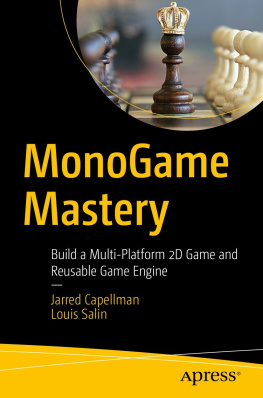

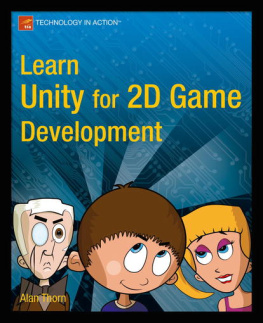

![Jayant Varma [Jayant Varma] - Learn Lua for iOS Game Development](/uploads/posts/book/124117/thumbs/jayant-varma-jayant-varma-learn-lua-for-ios.jpg)
![Damilare Darmie Akinlaja [Damilare Darmie Akinlaja] - LOVE for Lua Game Programming](/uploads/posts/book/124110/thumbs/damilare-darmie-akinlaja-damilare-darmie.jpg)
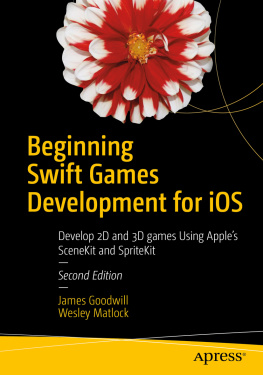
![Emanuele Feronato [Emanuele Feronato] - Flash Game Development by Example](/uploads/posts/book/120345/thumbs/emanuele-feronato-emanuele-feronato-flash-game.jpg)
